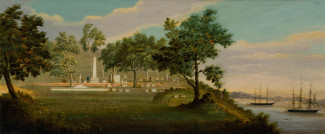
Johns Hopkins UniversityEst. 1876
America’s First Research University
"Season of Misery" for colonial Americans and true Yankees
Or, as Dennis Moore summarizes, Season of Misery “extrapolates from overwhelmingly catastrophic, unsettling details to examine larger questions” of America’s colonial period.For Donegan, the key question is not how settlers became American, but rather how they became colonial. Becoming colonial, Donegan shows, is a process of loss with very little gain; it is the disorientation of no longer being English, but not necessarily the new orientation of being something else either. Donegan dwells in the incoherence of Jamestown because it is precisely that lack of coherence which signaled the new formation of colonial (not American) identity. And in so many cases, the result of so much disorientation and incoherence was a suffering that resulted from, and produced, violence; and a violence that led to further suffering. What we see in Donegan’s book is story after story of bewildering confusion and death.

The vessel’s owner, Samuel Shaw, and two of his brothers would die of tropical fever within the first decade of America’s Old China Trade. As a “projector” of East Indies expeditions, Edmund Fanning lost not only shipmates and crew, but also entire ships which vanished without a trace. Harriett Low’s sojourn in Macao ended when her uncle and patron, William Henry Low, contracted tropical fever and died at the Cape of Good Hope. Robert Bennet Forbes’s life in the East was marked by great wealth and great loss—his brother Thomas, shipmates, friends, and relations. The Common-place discussion leaves historians of America and the world with a second, broader impression. The essays remind us of how much of global history—at least, the world beyond the Atlantic—still remains outside the ken of early American studies. Karen Stolley observes how Donegan’s book:Of the 61 men who boarded the Massachusetts in 1790, 48 (78 percent) were no longer living, many having died from disease and accidents at sea. The East, especially, had been a dangerous place for American mariners. They had “died at Macao” and “died at Canton,” were “lost overboard off Japan” or “murdered by the Chinese near Macao,” and enslaved in Algiers. Their remains were scattered across the East, “buried . . . outside of Batavia roads,” “buried under the walls of Macao,” and “thrown overboard in the Straits of Sunda.” (True Yankees, 63-64)
This is an important question, of course. As noted above, it challenges us to reconsider how we conceptualize the field. What is curious for historians, I wonder, is how confined that line is, how constraining in narrative construction, analytic authority, and comparative power. By limiting the construct to “Atlantic Studies or Transatlantic Studies,” historians of early America will find it difficult to recover the consciousness—the worldview, as it was called a generation or so ago—that scholars such as Donegan seek to understand.raises broader questions . . . about how we do Atlantic Studies or Transatlantic Studies or comparative studies generally in ways that recognize the complexity of metropolitan and colonial networks and that don’t impose contemporary geographic or cultural or disciplinary configurations. How do we go “beyond the line,” to generate a more inclusive consideration of comparative colonial experiences?




